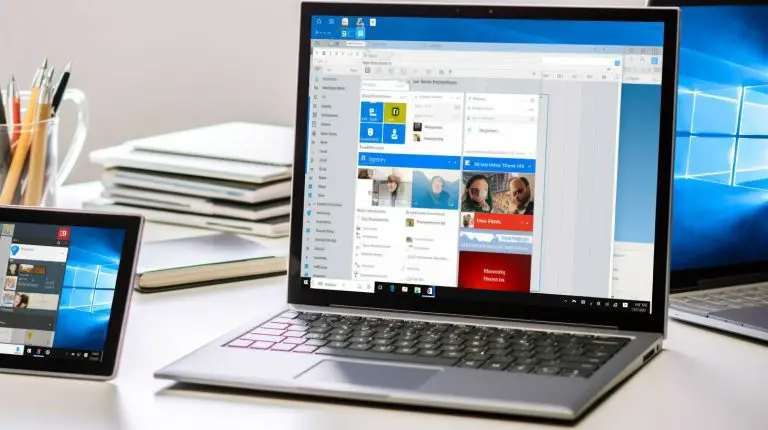Understanding Debian: What is Debian and Its Key Features?
Debian is a free and open-source Linux distribution that has gained popularity for its stability, flexibility, and extensive community support. It was first introduced in 1993 and has since become one of the most widely used Linux distributions worldwide. With a large community of developers and users, Debian offers a reliable and secure operating system that caters to a diverse range of needs.
Key Takeaways:
- Debian is a free and open-source Linux distribution known for its stability, flexibility, and large community support.
- Many popular distributions, such as Ubuntu, Linux Mint, and Kali Linux, are based on Debian.
- Debian offers a package management system for easy installation, updating, and management of software packages.
- It is available in three main channels: testing, stable, and unstable, with the stable channel being the most secure and reliable.
- Debian is highly compatible with servers and has a strong emphasis on open-source software.
The History and Origins of Debian
Debian was first introduced in 1993 by a group of computer enthusiasts and developers who aimed to create a free and open-source operating system. The project was led by Ian Murdock, who set out to build a system that would be freely available, easily customizable, and designed with a strong focus on stability and security.
The name Debian is a combination of the names of Ian Murdock and his then-girlfriend Debra Lynn, and it reflects the collaborative and community-driven nature of the project. From its early days, Debian embraced the philosophy of open-source software, encouraging users to share and contribute to the development of the operating system.
Debian quickly gained popularity among the Linux community for its reliability, flexibility, and commitment to free software. It became the foundation for numerous other Linux distributions, including Ubuntu, which is now one of the most widely used Linux distributions in the world.
Today, Debian continues to be developed and maintained by a global community of volunteers who work together to ensure its stability, security, and compatibility. The project is known for its extensive documentation, diverse range of available software packages, and its dedication to the principles of openness, freedom, and collaboration.
| Key Dates | Milestones |
|---|---|
| 1993 | Debian project founded |
| 1996 | First stable release, Debian 1.1 (Buzz) |
| 2000 | Release of Debian 2.2 (Potato), the first fully internationalized version |
| 2005 | Release of Debian 3.1 (Sarge), with improved package management |
| 2013 | Release of Debian 7 (Wheezy), featuring multiarch support |
Understanding Debian as a Linux Distribution
Debian is not only an operating system but also a Linux distribution, which means it is a collection of software bundled together with the Linux kernel to create a complete system. As a Linux distribution, Debian offers a range of benefits and unique characteristics that make it a popular choice among users.
One of the key advantages of Debian as a Linux distribution is its stability. With its rigorous testing and quality assurance processes, Debian provides a solid and reliable platform for both personal and professional use. Its stability is particularly important for server environments where uptime and reliability are crucial.
Additionally, Debian’s flexibility is another notable feature. It offers a wide range of software packages and supports multiple architectures, allowing users to customize their system according to their specific needs. This flexibility extends to the installation process as well, with various installation options and configurations available to suit different requirements.
Debian’s large and active community support is also worth mentioning. The Debian community is known for its dedication and expertise, providing assistance and guidance to users through mailing lists, forums, and extensive documentation. This strong community support ensures that users can find help and resources whenever they encounter any issues or have questions about using Debian.
| Key Features of Debian as a Linux Distribution: |
|---|
| Stability |
| Flexibility |
| Large Community Support |
Stability
Debian is renowned for its stability, making it an excellent choice for both personal and enterprise use. The Debian team puts great effort into testing and quality assurance, ensuring that the software included in the distribution is reliable and performs well. This stability is particularly important for server environments, where system uptime and reliability are of utmost importance.
Flexibility
Another key feature of Debian as a Linux distribution is its flexibility. Debian offers a wide variety of software packages, allowing users to tailor their system to meet their specific needs. Whether you’re a developer, a system administrator, or a casual user, Debian provides the tools and software you require. Furthermore, Debian supports multiple architectures, ensuring compatibility across different hardware platforms.
Large Community Support
Debian has a vibrant and active community of users and developers who provide valuable support and contribute to the ongoing development of the distribution. This community support is available in the form of mailing lists, forums, and extensive documentation, making it easy for users to find answers, share knowledge, and collaborate with others. The Debian community is known for its helpfulness and expertise, ensuring that users have access to valuable resources and assistance.
Key Features of Debian
Debian offers a range of key features that make it a popular choice among users, including its outstanding stability, flexibility, extensive community support, and robust security measures. These features contribute to making Debian one of the most reliable and secure operating systems available.
At the core of Debian’s appeal is its remarkable stability. It is known for its rock-solid performance, ensuring that users can rely on their system to run smoothly without frequent crashes or glitches. This stability is achieved through rigorous testing and quality control processes, making Debian an excellent choice for critical systems and server environments.
In addition to its stability, Debian is highly regarded for its flexibility. With a wide range of software packages available in its repositories, users have the freedom to customize their system according to their specific needs. Whether you’re a developer, a server administrator, or a casual user, Debian provides the tools and options to tailor your experience to suit your requirements.
Debian’s extensive community support is another standout feature. As an open-source project, Debian benefits from a dedicated and knowledgeable community of users and developers who actively contribute to its development. This vibrant community provides valuable assistance, support, and collaboration opportunities, making Debian a welcoming and inclusive ecosystem for users of all skill levels.
| Key Features of Debian |
|---|
| Outstanding Stability |
| Flexibility and Customization |
| Extensive Community Support |
| Robust Security Measures |
“Debian’s stability, flexibility, and community support make it an ideal choice for users who prioritize reliability and customizability in their operating system.”
Finally, Debian places a strong emphasis on security. With regular security updates and patches, Debian ensures that users’ systems are protected against potential vulnerabilities and threats. This commitment to security gives users peace of mind knowing that their data and privacy are well-guarded.
In summary, Debian’s key features, including its outstanding stability, flexibility, extensive community support, and robust security measures, contribute to its popularity among users. Whether you’re a seasoned Linux enthusiast or a new user exploring the world of open-source, Debian offers a reliable and flexible operating system that can be tailored to meet your individual needs.
Debian’s Package Management System
Debian’s package management system is known for its efficiency and ease of use, allowing users to easily install, update, and manage software packages on their systems. This system is one of the key features that sets Debian apart from other Linux distributions.
With Debian’s package management system, users can quickly search and install a wide range of software packages from the Debian repositories. The system takes care of resolving dependencies, ensuring that all required libraries and components are installed correctly.
In addition to installation, Debian’s package management system enables seamless updates and upgrades. Users can easily update their software packages to the latest versions available, ensuring that they have access to new features and important security patches. The system also allows for the smooth removal of software packages when they are no longer needed.
| Key Features of Debian’s Package Management System |
|---|
| Efficient and easy installation of software packages |
| Automatic resolution of dependencies |
| Seamless updates and upgrades |
| Simple removal of software packages |
The package management system in Debian ensures that users have a reliable and up-to-date software environment, as well as the ability to customize their systems according to their specific needs. Whether you are a beginner or an experienced user, Debian’s package management system offers a user-friendly and efficient way to manage your software.
The Different Channels of Debian
Debian offers three main channels known as testing, stable, and unstable, each catering to different user needs and preferences. These channels serve as different release branches, allowing users to choose the level of stability and reliability they require in their Debian installations.
The testing channel, also known as “Debian Testing,” provides users with access to the latest software packages and updates. It is intended for those who want to stay at the forefront of software development and are willing to accept some potential instability or bugs in exchange for access to the latest features. While testing channel packages undergo extensive testing, they are not yet considered fully stable.
The stable channel, aptly named “Debian Stable,” is the most reliable and secure option. It is designed for users and organizations seeking rock-solid stability and long-term support. Debian Stable undergoes rigorous testing and only includes packages that meet strict quality criteria. This channel is ideal for production environments, servers, and mission-critical systems where stability is paramount.
Lastly, the unstable channel, known as “Debian Unstable” or “Sid,” is an ongoing development branch that constantly receives updates and changes. It is primarily used by Debian developers and experienced users who actively contribute to the development process by testing and reporting bugs. Due to its ever-evolving nature, the unstable channel may be prone to instabilities and is not recommended for production environments.
| Channel | Stability | Target Audience |
|---|---|---|
| Testing | Variable | Users who want access to the latest software |
| Stable | High | Users seeking maximum stability and long-term support |
| Unstable | Low | Developers and advanced users contributing to Debian’s development |
In addition to these three main channels, Debian also offers additional channels such as experimental and backports. The experimental channel allows users to access software and updates that are still in the testing phase and may not yet be suitable for wider usage. The backports channel, on the other hand, provides users with the ability to install newer versions of specific packages on an otherwise stable Debian installation without compromising overall stability.
Debian’s multi-channel approach ensures that users have the flexibility to choose the level of stability and software availability that best suits their needs. Whether it’s staying on the cutting edge of software development or prioritizing rock-solid stability, Debian’s diverse channels offer something for everyone.
Debian’s Emphasis on Server Compatibility
Debian is highly compatible with servers and is often the preferred choice for server administrators due to its stability, reliability, and extensive support for server applications. As a free and open-source Linux distribution, Debian offers a robust and secure operating system that caters to the unique needs of server environments. Its commitment to providing regular security updates ensures that servers running Debian remain protected against emerging threats.
One of the key advantages of Debian for server administrators is its wide range of server applications that are readily available through its package management system. Debian’s package management system allows for easy installation, updating, and management of software packages, making it a convenient choice for maintaining a server’s software stack.
Debian’s server compatibility extends beyond just software. It also provides excellent hardware support, ensuring that server administrators can take full advantage of their server hardware capabilities. Whether it’s managing network interfaces, storage devices, or RAID controllers, Debian has extensive support for a wide range of hardware configurations.
Furthermore, Debian’s large and active community of users and developers contributes to its server compatibility. The community provides valuable resources, documentation, and support that server administrators can rely on when setting up and managing their servers. Additionally, the community’s constant feedback and contribution to Debian’s development ensure the continuous improvement and optimization of the operating system for server environments.
| Key Points: |
|---|
| Debian is highly compatible with servers and widely used by server administrators. |
| Debian’s stability and reliability make it a favored choice for server environments. |
| Its package management system allows for easy installation and management of server applications. |
| Debian’s hardware support ensures compatibility with a wide range of server configurations. |
| The large and active Debian community provides valuable resources and support for server administrators. |
The Role of Debian in the Open-Source Community
Debian plays a vital role in the open-source community, fostering the use of open-source software and contributing to the development and advancement of Linux. As a free and open-source Linux distribution, Debian has established itself as a cornerstone of the open-source ecosystem, offering a stable and reliable operating system that is trusted by millions of users worldwide.
One of Debian’s key contributions to the open-source community is its commitment to promoting the use of open-source software. Debian’s strict guidelines ensure that all software included in its distribution meets the Free Software Definition, guaranteeing users the freedom to use, study, modify, and distribute the software. This commitment to openness has not only encouraged the adoption of open-source software but has also contributed to the continuous improvement and innovation within the Linux community.
In addition to promoting open-source software, Debian actively contributes to the development and advancement of Linux. By providing a robust platform for collaboration and sharing, Debian has become a breeding ground for new ideas and technologies. Its large and diverse community of developers work tirelessly to improve the operating system, develop new features, and provide timely security updates. This collaborative effort has not only benefited Debian users but has also had a positive impact on the entire open-source community.
The Future of Debian
Looking ahead, Debian shows no signs of slowing down. With ongoing development efforts and upcoming releases, Debian continues to evolve and adapt to the changing landscape of technology. The Debian community remains dedicated to its principles of openness, cooperation, and user-centric design, ensuring that Debian remains a leading choice for both individual users and enterprise environments.
| Advantages of Debian | Disadvantages of Debian |
|---|---|
|
|
Installing Debian involves a series of steps that can be customized according to user preferences, offering a flexible installation experience. The process starts with downloading a Debian ISO image from the official website. Users can choose between the full installation image or a smaller netinst image, depending on their needs and available resources.
Once the ISO image is downloaded, it can be burned to a DVD or written to a USB flash drive using specialized software. This allows for booting the computer from the installation media and initiating the installation process. During the installation, users are presented with various options, such as selecting the installation language, keyboard layout, and timezone.
One of the key aspects of Debian’s installation process is its partitioning system. Users have the freedom to manually partition their hard drive or opt for an automated partitioning scheme. This allows for precise control over disk space allocation and the ability to set up separate partitions for the root directory, home directory, and other system directories.
Furthermore, Debian provides users with a wide range of software packages to choose from during the installation. This includes desktop environments, productivity tools, development libraries, and server applications. Users can customize their installation by selecting the specific packages they need or opt for a minimal installation and add packages later.
In addition to the installation steps, Debian provides documentation and resources to assist users throughout the process. The official Debian website offers detailed installation guides, forums, and community support channels where users can seek assistance and share experiences.
Overall, Debian’s installation process offers flexibility, customization options, and a wide range of software packages, making it suitable for both casual users and advanced professionals. By following the step-by-step instructions and utilizing the available resources, users can successfully install Debian and begin exploring its powerful features and benefits.
Table: Customization Options in Debian Installation
| Customization Options | Description |
|———————-|—————————————————————————————————|
| Language | Choose the language for the installation process and the default language for the installed system |
| Keyboard Layout | Select the keyboard layout that matches your hardware and preferences |
| Timezone | Set the timezone for your location |
| Partitioning | Manually partition your hard drive or opt for an automated partitioning scheme |
| Software Selection | Choose the software packages to be installed, including desktop environments, tools, and servers |
Quote: “Debian’s installation process offers flexibility, customization options, and a wide range of software packages, making it suitable for both casual users and advanced professionals.”
Additional Resources and Support
Debian offers a wealth of additional resources and support to assist users throughout the installation process. The official Debian website provides comprehensive documentation, ranging from installation guides to detailed FAQs and troubleshooting tips. Users can access these resources to find answers to common questions and resolve any issues they may encounter.
Furthermore, the Debian community is known for its strong support network. Users can join mailing lists, forums, and IRC channels to engage with experienced Debian users and developers, who are always willing to provide guidance and assistance. This sense of community collaboration adds to the overall Debian experience and ensures that help is readily available for users at all levels of expertise.
Another valuable resource provided by Debian is the availability of installation media in different formats. Users can choose between the traditional DVD or USB installation options, depending on their preferences and hardware compatibility. This flexibility ensures that users can easily find a suitable installation method for their specific needs.
In conclusion, the installation process of Debian offers not only a flexible and customizable experience but also a wealth of additional resources and support. With its extensive documentation, strong community, and diverse installation media options, Debian ensures that users have the necessary tools and assistance to successfully install and use this powerful Linux distribution.
| Installation Resources and Support | Description |
|---|---|
| Official Documentation | Comprehensive guides, FAQs, and troubleshooting tips available on the official Debian website |
| Community Support | Mailing lists, forums, and IRC channels where users can seek guidance from experienced Debian users and developers |
| Multiple Installation Media Options | DVD and USB installation options to cater to different user preferences and hardware compatibility |
Debian’s Approach to Security Updates
Debian prioritizes security updates, offering timely patches and updates to address vulnerabilities and ensure the protection of users’ systems. With its strong commitment to security, Debian has established itself as a reliable and trustworthy operating system in the Linux community. The Debian Security Team actively monitors and responds to security issues, working diligently to provide timely and effective solutions.
One of the key advantages of Debian’s security updates is its comprehensive coverage. Debian maintains a dedicated security archive, which includes security patches for both the stable and testing branches of the distribution. This ensures that users across different versions of Debian can benefit from the latest security fixes and enhancements.
Debian’s security updates are delivered through its package management system, which allows for easy installation and management of security patches. Users can rely on the APT (Advanced Package Tool) to seamlessly apply security updates, ensuring that their systems are protected against potential threats. The simplicity and efficiency of Debian’s package management system make it a preferred choice for both experienced users and newcomers.
| Advantages of Debian’s Security Updates | Disadvantages of Debian’s Security Updates |
|---|---|
|
|
Debian’s commitment to security extends beyond its own development efforts. The Debian Security Tracker provides a centralized platform for tracking and managing security issues across the ecosystem of Debian-based distributions. This collaborative approach ensures that security updates and patches are shared and implemented effectively, benefiting users of Debian derivatives as well.
Conclusion
Debian’s approach to security updates reflects its dedication to providing a secure and reliable operating system for its users. By prioritizing timely patches, comprehensive coverage, and efficient delivery, Debian ensures that its users are protected from potential vulnerabilities. While there may be some complexities and challenges associated with setup and maintenance, Debian’s commitment to security and collaboration makes it a trusted choice in the Linux community.
Advantages and Disadvantages of Using Debian
Using Debian has numerous advantages, such as its stability, flexibility, and extensive community support. The Debian operating system is renowned for its rock-solid stability, making it an ideal choice for mission-critical server environments. Its robust architecture and stringent development process ensure that Debian systems are both reliable and secure.
Flexibility is another key advantage of Debian. With its wide range of available software packages and customization options, users have the freedom to tailor their Debian installation to meet their specific needs. Whether it’s a lightweight desktop environment or a powerful server setup, Debian provides the tools and flexibility to create a system that suits individual requirements.
The Debian community is a vibrant and dedicated group of contributors who provide extensive support and resources for users. Whether seeking help on forums, accessing extensive documentation, or participating in collaborative development, users can rely on the Debian community for assistance and guidance.
However, it’s important to note that using Debian may require a certain level of technical expertise. The initial setup process and configuration can be more involved compared to other Linux distributions. Additionally, while the extensive software package options provide flexibility, selecting and managing the right packages for specific needs can be time-consuming and require a solid understanding of the system.
Table: Advantages and Disadvantages of Using Debian
| Advantages | Disadvantages |
|---|---|
| Stability | Technical expertise required |
| Flexibility | Time-consuming setup and configuration |
| Community support |
In summary, Debian offers a range of advantages, including stability, flexibility, and strong community support. However, it’s important to consider the potential challenges of setting up and managing a Debian system, which may require technical expertise and time investment. By weighing the advantages and disadvantages, users can make an informed decision when choosing Debian as their Linux distribution.
Debian-Based Distributions
Debian serves as the foundation for various popular distributions like Ubuntu, Linux Mint, and Kali Linux, providing them with a solid base and access to Debian’s wealth of software and community. These Debian-based distributions inherit the stability, security, and flexibility of Debian while adding their own unique features and optimizations.
Ubuntu: Ubuntu is one of the most well-known Linux distributions, loved for its user-friendly interface and extensive software library. It inherits Debian’s package management system, APT, allowing users to easily install and update software packages from both Debian and Ubuntu repositories. Ubuntu also adds its own graphical desktop environment called Unity, which provides a sleek and intuitive user experience.
Linux Mint: Linux Mint is another popular Debian-based distribution that focuses on providing a familiar and user-friendly environment for both beginners and experienced users. It offers different desktop environments, such as Cinnamon, MATE, and Xfce, giving users the freedom to choose the one that suits their preferences. Linux Mint also includes a variety of multimedia codecs and proprietary software, making it a great choice for multimedia enthusiasts.
Kali Linux: Kali Linux is a specialized Debian-based distribution designed for penetration testing and ethical hacking. It comes preloaded with a wide range of security tools, making it a valuable resource for cybersecurity professionals and enthusiasts. Kali Linux is known for its regular updates and strong emphasis on security, ensuring users have access to the latest tools and fixes.
| Distribution | Main Features |
|---|---|
| Ubuntu | User-friendly interface, extensive software library, Unity desktop environment |
| Linux Mint | Multiple desktop environments, multimedia codecs, proprietary software |
| Kali Linux | Specialized for penetration testing, preloaded security tools, regular updates |
Community Support and Collaboration in Debian
Debian’s community is a thriving and collaborative space, where users and developers come together to support and advance the Debian project. The Debian community plays a vital role in maintaining the stability, security, and quality of the distribution. With a large and dedicated group of volunteers, Debian benefits from a diverse range of skills and expertise.
One of the key strengths of the Debian community is its strong emphasis on open-source values. Collaboration is at the core of its philosophy, with transparency and inclusivity being fundamental principles. Developers actively contribute to the Debian project by creating and maintaining software packages, participating in discussions, and providing support to other users.
The community support is evident in the extensive documentation available on the Debian website. Users can access comprehensive guides, FAQs, and forums to find answers to their questions and troubleshoot issues. The forum serves as a platform for collaboration, where users can exchange ideas, share experiences, and seek assistance from fellow Debian enthusiasts.
Debian Community Structure
The Debian community operates under a meritocratic system, where contributors earn recognition and influence based on their contributions and skills. There are various teams within the community, each with its specific focus area such as packaging, bug tracking, documentation, and quality assurance. These teams work together to ensure the continuous development and improvement of Debian.
| Debian Community Teams | Focus Area |
|---|---|
| Packaging Team | Creating and maintaining software packages |
| Debian Bug Tracking System Team | Managing and resolving reported bugs |
| Documentation Team | Creating and maintaining documentation resources |
| Quality Assurance Team | Ensuring the quality and reliability of Debian |
The collaborative nature of the Debian community extends beyond its development efforts. Debian organizes conferences and events, such as the annual Debian Developer Conference (DebConf), where members can meet in person, share knowledge, and discuss the future direction of the project. These events foster a sense of camaraderie and strengthen the bonds within the community.
In conclusion, the Debian community is a vibrant and dynamic ecosystem that relies on the collective efforts of its users and developers. It exemplifies the power of open-source collaboration, where individuals from diverse backgrounds work together to create a robust and reliable Linux distribution.
The Future of Debian
Debian continues to evolve and adapt to the ever-changing landscape of technology, with exciting developments and future releases on the horizon. As one of the oldest and most respected Linux distributions, Debian has a strong foundation that allows it to remain relevant and competitive in the fast-paced world of open-source software.
Looking ahead, Debian is focused on improving user experience and streamlining installation processes. The development team is dedicated to enhancing the ease of use for both novice and experienced users, ensuring that Debian remains accessible to a wide range of individuals and organizations.
Additionally, Debian plans to expand its compatibility with emerging technologies and hardware architectures. This includes support for new processors, devices, and cloud platforms, allowing users to take full advantage of the latest advancements in the tech industry.
| Focus Areas for the Future of Debian | Benefits for Users |
|---|---|
| Improved User Interface and Installation Process | Enhanced user experience and easier installation for newcomers |
| Expanded Hardware Compatibility | Support for new processors, devices, and cloud platforms |
| Increased Collaboration with Other Projects | Integration with a wider range of open-source software |
| Enhanced Security and Privacy Features | Continued commitment to user data protection |
Debian’s future is bright, as it continues to foster collaboration among its community members and build on its strong foundation. With its emphasis on stability, flexibility, and security, Debian remains a reliable choice for individuals, businesses, and organizations seeking a robust and customizable Linux distribution.
Conclusion
Debian stands as a testament to the power of open-source collaboration, offering users a stable and flexible Linux distribution backed by a vibrant community of developers and enthusiasts. With its origins dating back to 1993, Debian has evolved into a widely respected distribution known for its stability, reliability, and extensive package management system.
As a parent distribution, Debian has paved the way for various popular distributions such as Ubuntu, Linux Mint, and Kali Linux, which are derived from its core principles and infrastructure. This open-source approach has allowed Debian to foster innovation and create a diverse ecosystem of compatible distributions.
One of Debian’s standout features is its commitment to security updates. The project diligently releases timely patches, ensuring the ongoing security of its users’ systems. Additionally, Debian’s compatibility with server environments and its emphasis on open-source software make it an attractive choice for server administrators seeking stability, flexibility, and community-driven support.
While Debian’s robustness and versatility are undeniable, setting up and using the distribution can be complex and time-consuming for newcomers. However, the extensive documentation and active community support offer valuable resources to help users navigate these challenges and fully leverage the power of Debian.
FAQ
Q: What is Debian?
A: Debian is a free and open-source Linux distribution that was first introduced in 1993.
Q: What are the key features of Debian?
A: Debian is known for its stability, flexibility, and large community support.
Q: What is the history and origins of Debian?
A: Debian was developed with the motivation to create a free and community-driven operating system. It was created by a group of individuals and has a rich history dating back to its beginnings.
Q: What is Debian’s role as a Linux distribution?
A: Debian is a Linux distribution known for its compatibility, reliability, and emphasis on open-source software.
Q: What are the key features that set Debian apart?
A: Debian is known for its stability, flexibility, strong community support, and security.
Q: How does Debian’s package management system work?
A: Debian has a package management system that allows for easy installation, updating, and management of software packages.
Q: What are the different channels of Debian?
A: Debian is available in three main channels: testing, stable, and unstable, with the stable channel being the most secure and reliable.
Q: How compatible is Debian with servers?
A: Debian has a strong emphasis on server compatibility and is highly compatible with various server applications.
Q: How does Debian contribute to the open-source community?
A: Debian promotes the use of open-source software and collaborates with other open-source projects to contribute to the development of Linux.
Q: What is the installation process of Debian like?
A: The installation process of Debian involves several steps and provides different installation options to cater to users’ needs.
Q: How does Debian handle security updates?
A: Debian is committed to providing timely and reliable security patches and updates to ensure the security of its users’ systems.
Q: What are the advantages and disadvantages of using Debian?
A: Debian offers strengths such as stability, flexibility, and strong community support, but it can be complex and time-consuming to set up and use.
Q: What are Debian-based distributions?
A: Debian-based distributions such as Ubuntu, Linux Mint, and Kali Linux are derived from Debian and offer unique characteristics and features.
Q: What is the role of community support and collaboration in Debian?
A: Debian has a strong community support system, and users can get involved and contribute to the development and improvement of Debian.
Q: What does the future hold for Debian?
A: Debian continues to undergo development efforts and has upcoming releases planned, demonstrating its commitment to technology advancement and community engagement.
- About the Author
- Latest Posts
Mark is a senior content editor at Text-Center.com and has more than 20 years of experience with linux and windows operating systems. He also writes for Biteno.com





